Introduction
Are you a small business owner looking for a way to improve website traffic and visibility of your site? Despite providing outstanding products and services, you can’t seem to attract more people to your site?
Link building for small businesses has helped them gain more impressions, visitors, and, resultantly, more profits.
But what the heck is link building?
Let’s start with the low-lying fruit.
How do you gain a real-life reputation? You make people refer others to your services and products, right?
Link building is pretty much the same thing but in the digital world. It means acquiring hyperlinks from external websites to your own. We call these hyperlinks Backlinks or Inbound links. These backlinks are technically tokens of credibility and importance in the online world.
If you don’t know where to start and are dying to know the ins and outs of link building for small businesses, then keep reading!
What is Link Building and Domain Authority?
Link building is the process of getting other websites to link to yours. Simply put, hyperlinks on someone’s site will direct a user to your site when they click on them.
Inbound links are Google’s top of the list ranking factory in Search Engine Result Pages (SERPs). With more high-quality backlinks, the search engines consider your content to be worthy of being ranked higher.
Earning more backlinks results in a higher Domain Authority. DA is a ranking metric developed by Moz that evaluates your whole link profile and encapsulates it into a single DA score.
Here’s the backlink analysis of Neil Patel’s site:
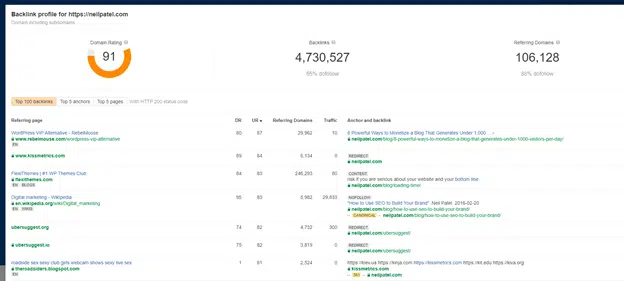
The links that connect the internal pages of your website are known as internal links. If many internal links point toward a specific page, Google will consider it more important and rank it higher in SERP.
Moreover, a backlink from a high authority website is much more valuable. Search engines have complex algorithms that evaluate the link profile of a website for ranking purposes. These algorithms use E-A-T to assess the quality of a backlink.
The importance of E-A-T
According to Google’s Search Quality Rater Guidelines, E-A-T (expertise, authoritativeness, and trustworthiness) determines your site’s credibility to be ranked for YMYL (Your Money or Your Life) topics.
So, here’s the thing, if you manage to get a backlink from a website having a high E-A-T, you hit the jackpot! On the other hand, with more quality backlinks and valuable content, your website itself demonstrates a higher level of E‑A-T.
Win, Win.
E-A-T is an essential factor that decides how your content is ranked in SERPs. Being a small business owner, your site must demonstrate expertise, authoritativeness, and trustworthiness.
Ranking metrics
Many online SEO giants have developed their own ranking metrics that predict how likely a website will be ranked on SERPs. These search engine ranking scores also show the strength of a website’s backlink profile on a scale of 1 to 100.
These ranking metrics are not from any search engine itself. They are just used to get an idea of the overall SEO and backlink performance of a domain.
Here are some of the famous ranking metrics you should check out:
o Domain Authority
Domain Authority (DA) is a search engine ranking metric developed by Moz. The domain authority score ranges from one to 100, indicating how likely the website is to be ranked on SERPs.
According to Moz, the DA is calculated after analyzing the quality of backlinks, the number of backlinks, inbound and outbound links, domain age, and linking root domains – along with several other factors.
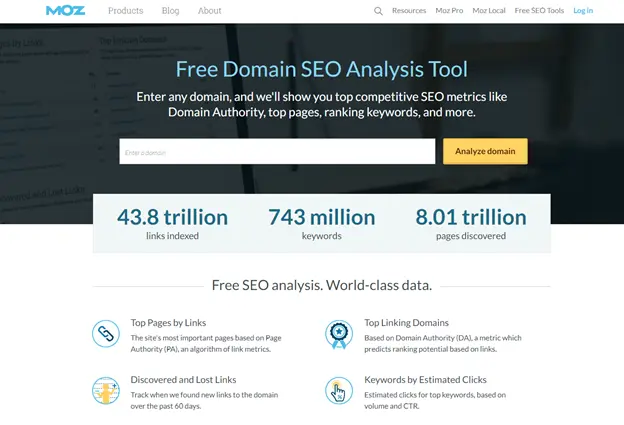
A higher DA score means a higher chance of being ranked on Google. Having a higher DA does not guarantee anything as it is only an indicator of your ranking on SERP.
o Domain Rating
Ahref has its own website authority metric called Domain Rating (DR). DR is calculated after examining the overall link profile of a domain.
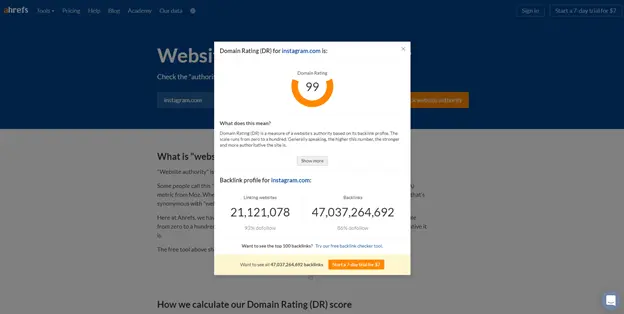
Ahref checks how many unique inbound links direct users to your domain, the website authority of those external websites, and the number of backlinks.
Domain Authority by Moz indicates how well your site will perform in SERPs, but Domain Rating gives you an idea of how healthy a site’s backlink profile is.
o Trust Flow & Citation Flow
Trust Flow and Citation Flow are flow metrics developed by Majestic. They both analyze the backlink profile of a domain but in different ways.
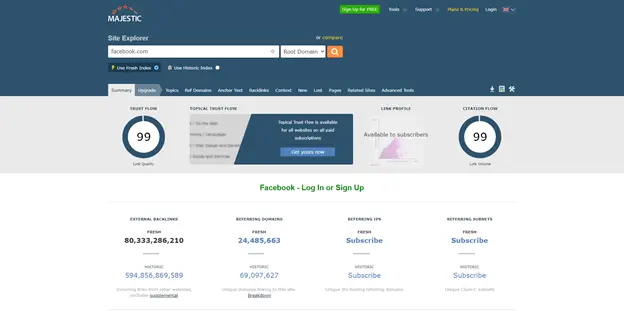
Trust Flow examines your site’s trustworthiness based on how trustworthy the external linking sites are. Simply put, it analyses the quality of your backlinks and assigns your domain a Trust Flow score in the range of 0-100.
Citation Flow evaluates how influential and popular a link might be based on how many sites link to it. The quality of these links is not considered in this case.
o SEMRUSH Authority Score
Authority score is also a similar ranking metric developed by SEMRUSH. It predicts how good a domain’s link profile is and its probability of being ranked in SERPs.
DoFollow Vs. NoFollow Links
We talked about how inbound links contribute to your SEO score, but do all links act as “votes of credibility”?
No, only the DoFollow links are what Google considers in ranking your website. Search engine algorithms crawl through these DoFollow links to see which websites are interlinked.
Google considers the quality and quantity of these links for ranking purposes. Hence, you should always try to score a DoFollow link from a reputable and trustworthy site.
Whereas a search engine does not consider a NoFollow link as a point of credibility. YOU tell the search engine that this hyperlink is a NoFollow one by including a small piece of code, called an attribute.
Here’s how a NoFollow link looks like:
rel=”nofollow”>Some Text
The attribute rel=”nofollow” tells the search engine that you don’t want it to attribute this link to your website.
So, why do you even need NoFollow links?
Being a small business owner, you need to create links to your own website from Facebook, Instagram, Twitter, or YouTube. These links do not need to be DoFollow as they don’t count towards Page Rank (also known as link juice).
However, social media sites play a crucial role in boosting brand recognition. Also, having legitimate NoFollow links can be a great source of referral traffic. An informative comment or a relevant forum post is an excellent way of building your brand.
How to build high-quality Backlinks
Let’s be honest, SEO link building for small businesses is hard.
In fact, it is the most time consuming and nerve-racking part of an SEO strategy.
But with the right set of tactics, you can grab the attention of search engines and external websites.
Here are the top three tactics that ensure successful link building for small businesses.
1. Get in touch with local bloggers and niche-specific influencers
Bloggers and established influencers produce regular content that hundreds or even thousands of people trust and love to read.
Instead of building your own audience from scratch, you can target theirs by becoming contributors to their blogs, adding insightful comments, and answering queries. While doing all this, you can occasionally put out a link to your own site.
Here’s an example of SETH J. GILLIHAN, who managed to score a backlink from web MD to his own site ThinkActBe.

In the case of small bloggers, you can partner with them by providing ideas and content for future blog posts in exchange for a DoFollow backlink.
2. Benefit from local businesses and partnerships
If your business has ties with the local market, leverage it! Getting links from the websites of local companies is far easier than a backlink from a big firm.
If you don’t have any local collaborations, start with targeting your niche-related local businesses. Attracting partnerships in a specific geographic area can be the kick in the pants your link building strategy requires.
Here’s an example of how sponsoring an event could help you gain a high-quality backlink.

3. Content Marketing
Content marketing is, by far, the most convenient way to gain links. It is indeed a long-term process, but the results can automate your whole link-building campaign.
For this, you can start a blog on your site, hire a full-time writer, and produce unique content that addresses user intent.
Many other small businesses are doing the same to attract customers and link building opportunities, but there is always room for improvement.
You can do a bit of competitor analysis and produce the same piece but with your own touch and practical examples.
And finally, you can reach out to influencers and partners to build organic links and drive traffic to your website. Guest posting also works in building links, but don’t go over the limit with it.
Intel, a tech giant, has its own dedicated blog section just for this purpose.
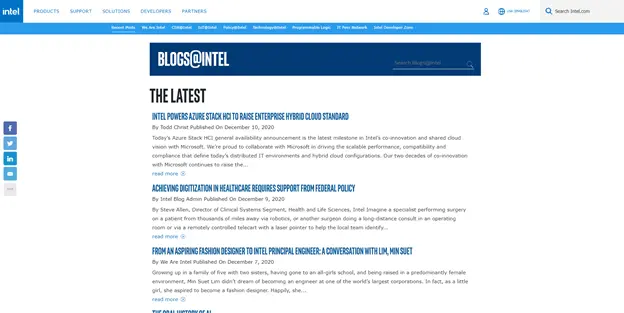
Dos and Dont's of link building
Google’s ranking algorithm receives an update every now and then. Keeping up with PageRank’s guidelines is much more complicated than what it was a decade ago.
Here are some of the best and possibly the worst link building strategies you should keep in mind:
The Dos:
o Content Is King
Producing relevant and high-quality content should always be your first preference. Being a small business owner, you need to establish yourself as an authority in the respective field.
If you want someone to recommend you, you must provide value to their customers. Your content should be in-depth, evergreen, and highly informative. Using a professional content creation agency like Chatter Digital is a fast and efficient way to outsource this.
o Always go for sites with higher E-A-T
Pursing sites with a low E-A-T score is just pointless. When it comes to link building, it’s always quality over quantity.
Try to build links with high domain authority websites, and you’ll be good to go.
o Forum posting and social media marketing
Find authoritative websites in your niche and join their discussion forums. Answer queries, post comments, take part in questions, build credibility, and be sincere in what you’re doing.
Do the same on social media websites like Facebook and Twitter. To build links, you can occasionally drop a link to your own site or include your website in your signature.
The Don'ts:
o Don't use Black hat tactics
Google’s Penguin update penalizes for linking to low-quality websites. So, if you’re planning on buying backlinks, inbound links from irrelevant websites, or maybe spam your link in forums, just DON’T.
Hidden text links, injecting links into a site you don’t own, or anything designed to manipulate Google will fail. Google is not dumb.
o Trading links is a big NO
Link exchange with your niche-related websites is only useful if it’s done naturally. If the sole purpose is to spam each other’s links on your websites, Google is smart enough to recognize that.
Keep the link building process as natural as possible. If search engines notice an unusual amount of links with a site, it will get penalized.
Why is link building so important for your business?
And finally, why is link building important?
Google’s PageRank Algorithm considers the inbound links of the page for ranking purposes. The algorithm is quite old, but even today, link building is the most significant off-page SEO strategy for online success.
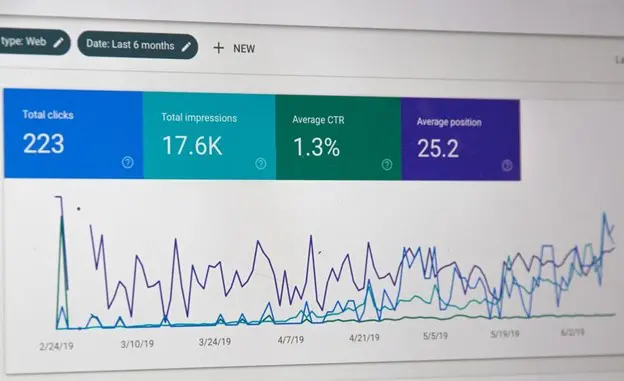
How does it work? Search engines use these links to crawl the web. This includes all the inbound and outbound links of a website. After that, the search engines assess the content of those pages and adds it to their index.
Yes, we all have heard “content is the king,” but in link building, the number of external websites that think your content is worth pointing to is what matters.
More high-quality backlinks = higher rankings in SERP
These backlinks are “votes of confidence” for a search engine. The more votes your business has the higher chances of attracting potential customers and converting them.
Link building for small businesses is instrumental as it helps boost brand recognition and visibility of your site in search engines.
Conclusion
Link building for small business takes time and effort to show results. Many small businesses don’t even try to take the first step but remember, SEO link building is the most fundamental part of your SEO strategy.









2 Comments